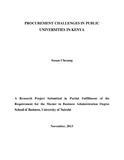| dc.description.abstract | Every organization, whether it is a manufacturer, wholesaler, or retailer, buys materials,
services and supplies to support operations. The public procurement system in Kenya since
1978 has evolved from a crude system with no regulations to an orderly legally regulated
procurement system currently in use. Many institutions including public universities
experience difficulties during pre-qualifications, staging competitive procurement process,
warehousing supplies, carrying out quality assurance, clearing at customs, over and underinvoicing
in imports and local procurements and availing adequate finances equivalent to
sourced resources to implement the Act. Thus, this study intended to shed more light on
procurement process challenges in public institutions in Kenya guided by the following
question; what are the procurement challenges facing public universities in Kenya? What
would be the scenario if the Public Procurement and Disposal Act(PPDA) procedures were to
be followed to the letter?
Based on the objectives and the analysis of the study, the analysis showed that majority of the
staff members are involved in procurement and they have been in the university for three to
five years. This is an indication that experience is a very important factor in the procurement
processes. Majority of the institutions increased the number of suppliers in the last three years.
This could be attributed to several factors such as elevation of some of the university colleges
to fully fledged universities. The study indicated that 30 percent of the respondents felt that the
suppliers did not meet their requirements. This could be another reason why the number of
suppliers changed in the last three years in some of the universities. Quality is another factor
that could lead to the change of the number of suppliers in an organization. The fact that 58.9
percent of the respondents pointed out that supplier did not produce materials with consistent
quality is another reason that could lead to the change in the number of suppliers.
In some of the institutions, the procurement was constantly looking for new suppliers
represented by 43 percent. This is a clear indication of how unsatisfied the institution’s
procurements were and it led to the change of the number of suppliers. The study concluded
that 39.9 percent of the institutions did not have long-term relationship with the suppliers and
their purchasing was fully centralized. To examine whether the purchasing function of the
public universities in Kenya has a formally written long-range procurement plan, the findings
x
revealed that most of the institutions purchasing function has a formally written long-range
procurement plan. The study also revealed that purchasing is not included in the institution’s
strategic planning process. The communication with the suppliers was also poor given that the
respondents indicated that the exchange of information with the suppliers was not done
frequently, formerly and in timely manner. However, most of the institutions used Electronic
Data Interchange (EDI) and computers to process orders. To examine whether Public
Procurement and Disposal Act helps in addressing procurement challenges, the study identified
that 71.8 percent of the respondents totally agreed that PPDA helps in addressing procurement
challenges. This is a good remedy for finding the solutions for most of the challenges. Those
who were and were not in the procurement activities indicated that PPDA helps in addressing
procurement challenges. | en |

